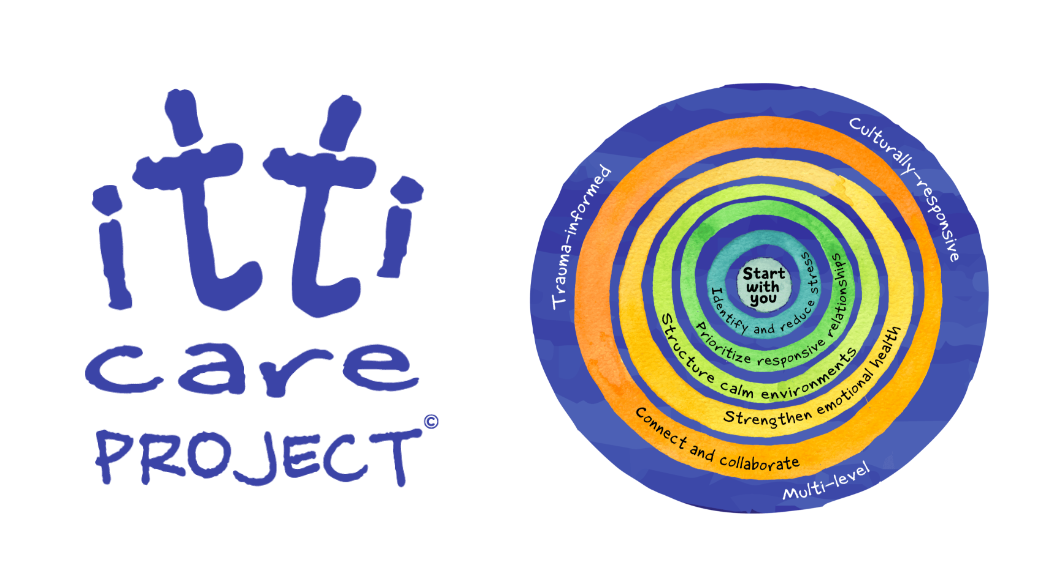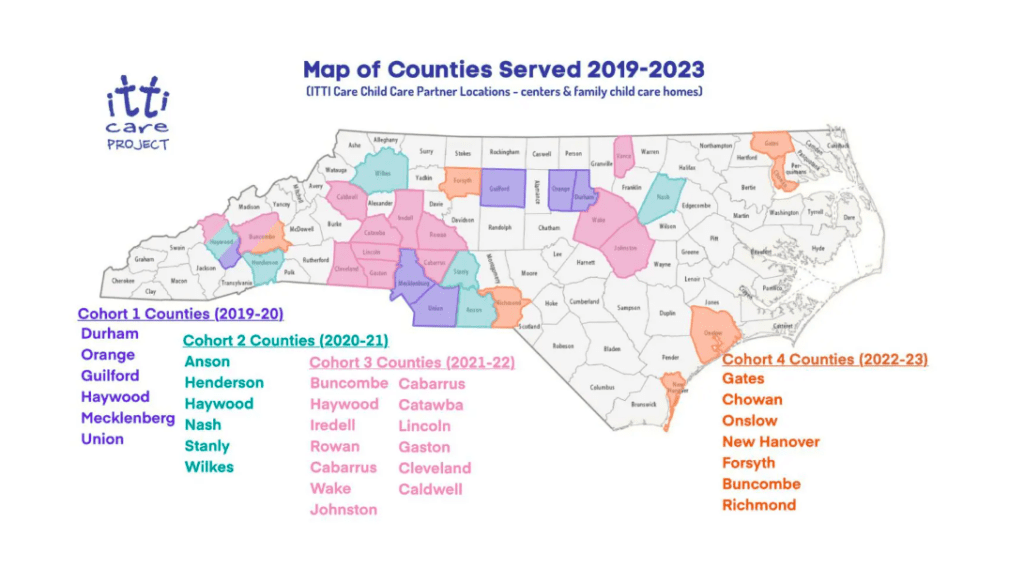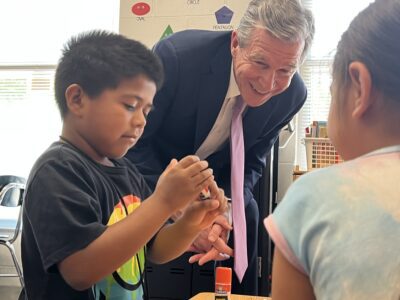
|
|
Applications are now open to join the fifth and sixth cohorts of the Infant Toddler Trauma-Informed Care Project (ITTI Care), which trains early childhood professionals as coaches in trauma-informed care.
ITTI Care is a research project based out of Duke University and funded by North Carolina’s Division of Child Development and Early Education. The mission of the project is to support the wellness of the early childhood workforce, ensuring they feel “seen, heard, and held” in their workplaces. This equips them to provide the very best care to the children they teach, even when they face challenges in their own lives.
“I think that’s transformative work, because we are brain builders and it starts at birth,” said Natasha Brown, a coach from the third cohort who works as a birth-to-3 specialist at Child Care Resources Inc.
By training professionals who work for organizations like Smart Start or Child Care Resource & Referral (CCR&R) agencies, the ITTI Care model also builds capacity for systems-level change statewide as coaches bring their training back to their employers.
Gail Mattingly, a coach from the first cohort, has carried her ITTI Care training into her role as program director for the Southwestern Childhood Development Commission.
“I got to really experience what it felt like to be held and heard,” Mattingly said, “and I want to do that for everybody.”

How ITTI Care works
Members of the next ITTI Care coaching cohorts will support the staff members of early care and education sites in a variety of ways — whether teachers are coping with the stress of caring for an elderly parent, managing the transition from pandemic isolation, or navigating burnout. Coaches help teachers take care of themselves, so they can take care of their students.
To be eligible for the project, applicants must be in roles providing one-on-one, on-site coaching support to licensed child care programs that serve infants, toddlers, and 2-year olds. Brown and Mattingly both work for their local CCR&R programs.
Applicants must nominate at least two early care and education sites that they would like to work with. They also must have the support of their supervisor and organization. Additional details about the application can be found here.
Starting after July 15, 2023 — the next application deadline — the ITTI Care team, led by the project’s director, Ennis Baker, will evaluate applications.
“This kind of starts the process of relationship building and helps us get a sense of, has this person been ‘voluntold’ to do this, or do they really want this,” Baker said.
Katie Rosanbalm, ITTI Care’s principal investigator, and Whitney McCoy, ITTI Care’s equity and inclusion specialist, will meet with applicants and visit their proposed child care sites.
“In that process, we kind of figure out who’s really excited about it, who’s really ready for it,” Rosanbalm said.
She and McCoy also meet with teachers and walk them through what to expect if their coach’s application is approved and their site is chosen.
“That’s a whole day of just Whitney and I getting immersed and letting them, really, ask us all the questions that they have,” Rosanbalm said.
Sign up for Early Bird, our newsletter on all things early childhood.
It’s all about building relationships and trust between the ITTI Care team and the site’s administrators and teachers.
“I remember going to one of the centers last fall and someone said, ‘Oh, so you’re not here just for the kids, you’re here for us,’ ” McCoy said. That realization is the key to ITTI Care’s work, and part of how the team chooses which sites and which coaching applicants are selected.
Coaches begin their training in September. This includes 20 hours of training with ITTI Care staff and 30 hours of independent work. Coaches start six months of implementation at their sites starting in January, coaching administrators in trauma-informed practices and helping them navigate how to best support their teachers.
Jennifer Gerringer works as the children’s services coordinator at Irene Wortham Early Learning Center in Asheville. Her site received coaching as part of the fourth cohort.
“We felt like it was a great program that would focus more on ourselves and how important it is for us to be able to take that time for ourselves and realize what we need,” Gerringer said, “because children are so susceptible to how we’re feeling, whether we verbalize it or not.”
This work continues through the spring, culminating in a “Day Away” for the entire staff. The staff of the Irene Wortham center had their Day Away on May 26, 2023.
Tiffany Parker leads the 8-month to 2-year classroom at Irene Wortham, which she says is “the best job in the world.”
Parker described her center’s work with their ITTI Care coach as “amazing because the focus is on the teachers and getting them to a positive place and giving them the resources and tools to manage their emotional, social, and physical (well-being).”
Jill McElreath, an NC Pre-K teacher at Irene Wortham with 39 years of experience, told EdNC about the impact of her center’s Day Away.
“I thought it was important that teachers get a time away to connect with other teachers at the center,” McElreath said. “That promotes a lot of bonding and teacher interaction, and it makes the team stronger as a whole.”
Administrators and teachers continue implementing what they’ve learned through trauma-informed coaching long after the formal completion of the project.
“It’s not a one and done,” Natasha Brown said of the centers she coached. “It’s something that you continue to cultivate and make your own, because you create a culture with your staff.”
“Every day might not be a great day, but every day doesn’t have to be a hard day,” Brown said.
Coaches also continue applying what they’ve learned, not only with the work they do one-on-one with teachers and administrators, but with their supervisors at their own organizations. As part of the ITTI Care Project the supervisors of coaches receive training in reflective supervision.
After participating in the first cohort, Gail Mattingly now oversees the coaches in her region.
“Professionally it’s supported me in walking the walk and talking the talk, not only for me to do my self care, but to promote and advocate others to do their self care,” Mattingly said.
This is all part of the ITTI Care theory of change that encompasses everything from child resilience to systems-level change.

Why ITTI Care works
Research shows that children who form strong, responsive relationships with adults who know how to support their development are more likely to have healthy and robust brain development in the earliest years of life — which is when the bulk of neurological development occurs.
But early childhood is also a time when young brains are particularly susceptible to the negative effects of traumatic experiences and toxic stress.
Young children aren’t the only group who are at risk in the early care and education setting.
The early childhood workforce is made up almost exclusively of women, a disproportionate number of whom are women of color. Teachers of infants and toddlers are not paid family-sustaining wages and typically are not offered benefits such as health insurance or paid vacation. This puts them at high risk of burnout, which puts strain on the child care industry, the workforce behind the workforce.
“Parents, teachers, kids, administrators, we’re all trying to get on the same page and know the importance of emotional wellness and how to process things,” Gerringer said. “If we’re not dealing with stressors or we’re not processing our emotions or things that we’ve been through appropriately, it can just continue to snowball and move on from one person, to the next person, to the next person.”
The ITTI Care model starts with the individual, identifying and reducing sources of stress or trauma, then prioritizing strong relationships and structuring calm environments. From there, the model emphasizes strengthening emotional health and connecting and collaborating within the workplace.
By training coaches who already work at organizations that support early teachers and administrators in early care and education settings, ITTI Care reaches a wide array of people who influence the lives of thousands of infants and toddlers — and their families.
Jennifer Gerringer’s summary of what she as an administrator wants for her teachers could easily apply to what teachers likely want for students, what coaches want for administrators, or what supervisors want for coaches: “We want to give them that supportive and nurturing environment so they can overcome the negative aspects of their life or things that might be going on at home.”
Since 2019, ITTI Care has trained 34 coaches to work with 41 child care centers and eight family child care homes in 32 counties.
Potential coaches for Cohort 5 (2023-2024) and Cohort 6 (2024-2025) must apply for the project by July 15, 2023. Details of the application can be found here.
Recommended reading




